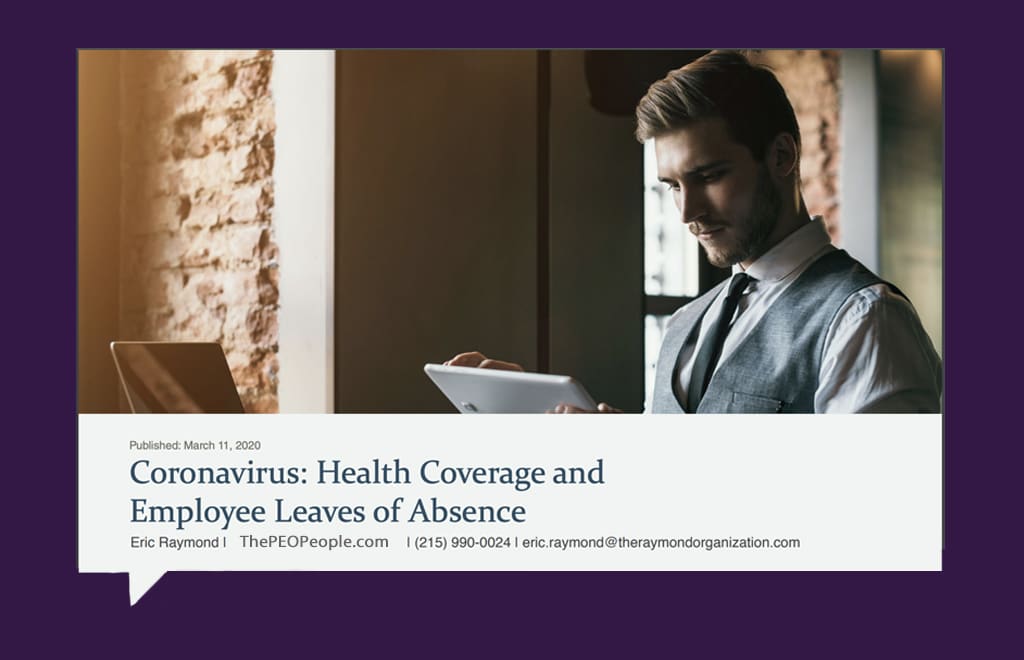
Coronavirus
Health Coverage and
Employee Leaves of Absence
As the new coronavirus disease 2019 (“COVID-19”) continues to spread, many employees are wondering whether there is coverage under their medical plan and whether they can take a leave of absence. The following provides some high-level information intended to address these inquiries. This information is up to date as of March 9, 2020, is general in nature, and subject to change.
Health Coverage
According to the CDC, individuals who feel sick with fever, cough, or difficulty breathing, and have been in close contact with a person known to have COVID-19, or live in or have recently traveled from an area with ongoing spread of COVID-19 should call their healthcare professional. The healthcare professional will work with the state’s public health department and CDC to determine if the individual needs to be tested for COVID-19. Keep in mind that tests associated with COVID-19 have not been readily available to date.
Is the Test Covered?
1. General Coverage. In most traditional group health plan arrangements, testing for COVID-19 should be covered like other diagnostic tests (e.g., the flu test or rapid strep test) when medically necessary. Non-traditional group health plans (e.g., skinny plans (preventive care only), some reference-based pricing arrangements, and short-term limited-duration insurance) may not provide coverage. The plan document terms should be consulted.
2. State Law. Some states, including Alaska, California, New York, Oregon, and Washington, have issued statements and/or emergency rules requiring (among other things) insurance carriers to cover services associated with testing for the COVID-19 without cost-sharing. It is likely that other states have adopted (or will adopt) similar rules after this article was set for publication. This includes Colorado, Florida, Georgia, Hawaii, Maryland, Pennsylvania, and Utah. These rules generally apply to fully insured health plans, including small and large group plans. Self-funded group health plans subject to ERISA are not required to comply with state mandates. Employers with self-funded group health plans should work with their benefits consultants and third-party administrators to determine whether to adopt plan changes to align with the state action. In some situations, the carrier (or TPA) is asking employers with self-funded health plans to “opt-in to” (or to “opt-out of”) of the enhanced benefit options.
3. HSA-compatible QHDHPs. A qualified high deductible health plan (“QHDHP”), in part, is a health plan with a minimum deductible ($1,400 for self-only coverage and $2,800 for coverage other than self-only for 2020). An individual with a QHDHP and no other disqualifying coverage may be eligible to establish and contribute to a health savings account (“HSA”). Generally, a QHDHP may not provide benefits for any year until the individual meets the deductible for that year. However, there is a safe harbor that permits coverage for preventive care prior to meeting the deductible. The definition of preventive care is limited and includes:
-ACA mandated preventive items and services;
-periodic health evaluations, such as annual physicals (and the tests and diagnostic procedures ordered in conjunction with such evaluations);
-routine prenatal and well-child care;
-immunizations for adults and children;
-tobacco cessation and obesity weight-loss programs;
-certain screening devices as listed in IRS Notice -2004-23; and
-items and services associated with certain chronic conditions as identified in IRS Notice 2019-45.
However, except as it relates to certain identified chronic conditions, preventive care does not include any service or benefit intended to treat an existing illness, injury or condition.
At this point, it is not clear whether testing and treatment for COVID-19 is considered preventive care and therefore not subject to the deductible. Absent guidance from the IRS, QHDHPs should consider applying the deductible toward expenses associated with COVID-19 to preserve HSA-eligibility. Further guidance from the IRS would be helpful.
Other Benefits and Protections
1. Disability benefits. Will a COVID-19 diagnosis trigger a short-term disability benefit? Per the CDC, reported illnesses associated with COVID-19 range from mild symptoms to severe illness. Therefore, each employee will need to be evaluated on a case-by-case basis, depending on the individual’s condition and the definition of disability under the terms of the plan. For example, someone who is asymptomatic but asked to stay home may not be eligible for disability benefits while someone who is hospitalized would be eligible.
Employees in California, Hawaii, New Jersey, New York, Rhode Island, and Puerto Rico have access to state-mandated disability leave.
2. Leave. Employers should evaluate whether employees with COVID-19 qualify for paid leave. Arizona, California, Connecticut, Washington D.C., Maryland, Massachusetts, Michigan, New Jersey, New York, Oregon, Rhode Island, Vermont, and Washington have different forms of paid leave laws (sick, family, and/or medical). In addition, paid leave may be available under a city law, employer policies, collective bargaining agreements, etc.
Employers should also evaluate whether employees with COVID-19 qualify for unpaid FMLA leave due to the employee’s own serious health condition. Further, an employee may qualify for unpaid FMLA leave due to a family member’s serious health condition.
Whether an employee on a non-FMLA leave is eligible to continue benefits will depend on the benefit plan and applicable law.
Employer Action
We can help with benefit related inquiries, but COVID-19 raises many other issues such as employment-related issues in which case employers should reach out to counsel.
For more information on COVID-19:
CDC dedicated website, https://www.cdc.gov/coronavirus/2019-ncov/index.html
A PEO can help stream-line life as it gets back to normal, along with help with the re-hiring process. Compare PEOs hassle-free here.
These are uncertain times and your PEO-OLOGIST is here to answer any questions you may have. Call us! (888)8THEPEO or schedule a quick phone call here.

